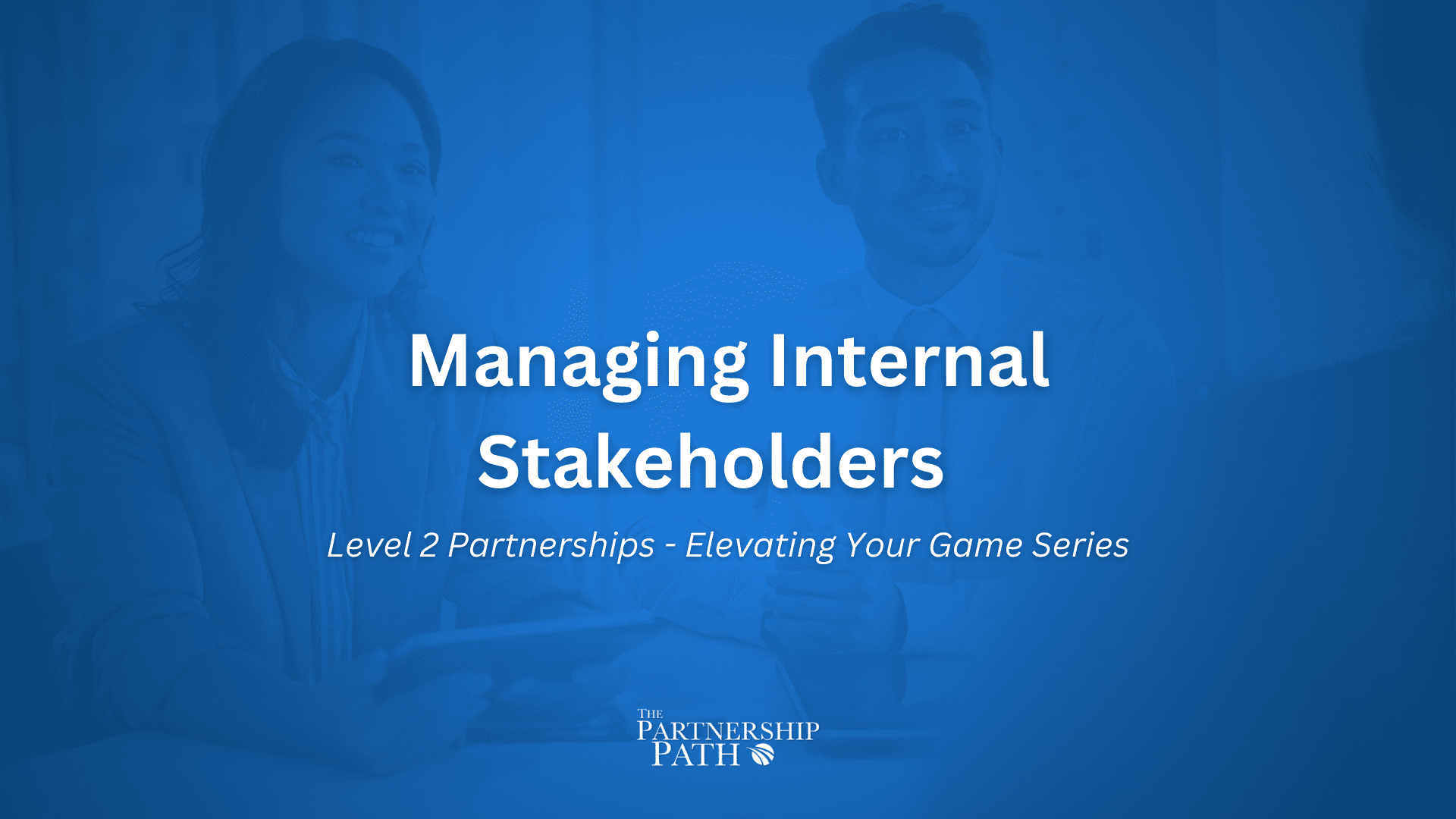Main Episode
IRL Episodes
Co-Selling With Partners to Seal the Deal
Episode Summary
Co-selling can be as stressful as teaching your teenager how to drive. Yet, with the right approach, it can also be rewarding and highly effective. In this discussion, we delve into the nuances of co-selling with partners, drawing parallels between the personal experience of teaching someone to drive and professional sales partnerships.
Whether you’re a seasoned sales professional or new to co-selling, this video provides valuable insights and practical advice on how to navigate this complex but essential aspect of sales.
Transcript
John: Well, good morning, Toni. I’ve been thinking about you because I had a conversation with a friend of mine the other night and it reminded me that I never heard the end of the story about you teaching your daughter how to drive. And I know we had some exchanges about the stress that that was creating. And I’m sure our listeners can appreciate stress.
Toni: Yeah.
Toni: All right, we did.
John: Yes.
John: Around that kind of stuff. So anyway, I just, I was just curious, how’s she doing? Is she driving? Is she like…
Toni: Yeah, she has passed her test. It’s quite funny actually, because we saw some friends, we went to a local pub and there was a friend of ours whose daughter works there, my daughter also works there, and he is teaching his daughter to drive and he’s like, oh gosh, she wants to drive home. And I was like, I remember, and it is funny, it’s one of those things that when you’re going through it, it feels so high stress and then you get through it and go, oh, we did that. So yes. And now she’s just like out and about loving life. And whilst this probably ties into our topic today, actually, because I helped her to, we did it together. I mean, it’s hers. She, you know, she passed the test, but we were working alongside one another for her to then go.
John: Awesome.
John: Yeah, yeah, yeah.
Toni: Do I think? Yeah. Yeah.
John: That’s right. That’s right. So Toni, I didn’t even think of that, but you’re right. Our topic today is co-selling with our partner. And you’re exactly right. I mean, teaching someone how to drive is part of co-selling because you’re kind of teaching your counterpart some of the important things about how your solution needs to be sold or positioned or whatever.
Toni: Yeah. Yeah.
John: Kinds of objections, you get all that kind of stuff. And so that, I wish I was as smart to have thought that would be a great intro for this topic, but I literally was interested in your experience. So anyway.
Toni: Haha. Yeah, yeah and now I have to do it again next year for our son but you know I’ve got breathing space.
John: I’d love to tell you that the second one’s easier, but in my case, the second one was actually more challenging. But I had a, I had a boy that was the older one and a girl was the younger one and she was a little more emotional, I guess, around the driving thing. I don’t know. I don’t know. She, she, she actually, she actually ran into a fire hydrant with one of our cars. So, you know, this was before she had a driver’s license. This was while we were…
Toni: You won’t be watching this.
John: Co-selling with her.
Toni: Well, sometimes we meet bumps in the road, don’t we, along the way? Yes. We do.
John: We do. And we learn from them. And she has not had an accident since. So I think that’s a really positive thing. Yeah. Yeah.
Toni: It is, yeah. So, co-selling.
John: So let’s talk about co-selling. Yeah. You know what? Let’s start this one by being really clear about what we mean by co-selling, right? Because I think it’s another one of those words that maybe gets thrown out there that people have different definitions for. So when you think of co-selling, what does that look like? What was your experience with co-selling?
Toni: Yes. Um, that where it took me initially, when we talked about these topics, it took me straight to enterprise selling and thinking about those enormous deals, which for me, I would be looking to align people. But for a colleague of mine that I used to work with, she was an amazing saleswoman and she wanted to be in the thick of it. So she was there in the customer meeting. So I think.
John: Okay, yep. Yeah.
Toni: Really interesting how there are different ways that people can become involved, I guess. And for me, I would have shied away from being a lead in that customer meeting, but for a colleague who had the same job role as me, she wanted to be there signing the paperwork. So I would love to get into a bit of this.
John: Yeah, I think that’s actually a great kind of lead in because I do think co-selling covers that entire span. And it’s highly situational. Like you’ve described a scenario that’s more based on the individual skill sets. But I also think depending on the nature of the partnerships and the size of the organizations involved, that also drives a different kind of definition, right? If you’re… If you’re a vendor organization working with lots of smaller resellers, I think that channel manager or partner manager getting involved in the deal with the customer is an often definition of co-selling, where if it’s two really big companies going to market together, it’s more the coordinating that you’re talking about of bringing the two kind of sales and sales resource teams together to get the deal done.
Toni: Yeah. And to that point, there could be things like sales operations. So sometimes it is the customer is saying, I want a concession that the partner can’t offer that needs to be escalated. So yeah, it could be, I want a technical specialist to demo something, or I need a concession or wait. So I think, yeah, it’s quite a broad, um…
John: Yeah, it is.
Toni: Church. Yeah.
John: And it’s also, to that point, you just raised another idea for me too, which is when we’ve got these smaller partnerships who have great local relationships with their customers, but because they’re reselling something from a big vendor, sometimes the customer says, hey, I need to meet someone from this vendor just to know that. They’re real, that they care about us, that this makes sense, that you’re a partner that matters to them. Sometimes there’s just a credibility element that is in that as well. So co-selling is a big word, big definition. I think where I want to go with this and what I think we want to kind of talk about is, how do you do any of those and actually still make it scalable?
Toni: Yeah.
John: Because the whole idea of partnership is scalability, right? The reason we partner with someone else is because they either have something that we don’t, or they can get us somewhere that we’re not. And so that’s about scalability as a business. But if, like the example you gave of the colleague that wanted to be in every deal, that’s not very scalable.
Toni: No.
John: If you have to be involved in every deal with your partner, then you might as well sell it direct. So it kind of depends on the scenario.
Toni: Yeah. Yeah, yeah, it’s, it’s quite, um, I was thinking about where, like you say, you’ve got the different, different partners have different needs and I remember requests for like funded heads. We want a funded head to effectively fulfill a role in our business that we don’t have. So how would you kind of approach that?
John: Yeah, yeah, yeah, yeah.
Toni: Setting the co-selling expectation with a partner.
John: That’s right. Yeah. We talk a lot about rules of engagement, which is exactly what you’re describing, right? So how do I establish essentially a protocol with each partnership that says things like, what does a deal look like in order for me to be involved? What has to have happened?
Toni: Yeah.
John: In advance of my involvement for either me or one of my resources to come and be involved. Now, this has a bit of a reseller bent to it, right? That kind of rule of engagement that says, hey, if you’re reselling my stuff and you want someone from the vendor to be involved, then there’s certain criteria that have to be met. And then those rules of engagement would also potentially include kind of what roles will we play in the sales cycle?
Toni: Yeah.
John: And how long will we be involved and all that. And it gets at all the things you’re talking about, like is it negotiation? Is it demoing? Is it value proposition creation? You know, like all that stuff, like we want to kind of pre-define a lot of that. If I take that rules of engagement idea and transfer that to a more ISV type of relationship where we’ve got, you know, two established software companies that… For whatever reason, their two solutions work well together and they’re going to market together. The rules of engagement also need to be established, which is, hey, when is a deal big enough, dangerous enough, competitive enough, like whatever those criteria are that would require resources from both sales organizations to come together and be involved in that. And then what would that look like? Because I think the other thing that’s really challenging,
Toni: Yeah.
Toni: Mm-hmm. Yeah.
John: Around co-selling is who’s in charge, right? When we bring two sales resources together, they both want to be in charge. So how do we pre-define who’s in charge? Because you can’t have two people running the ship, right?
Toni: Yeah.
Toni: No, and you’ve also got when there’s like you say with the ISV piece as well, there could be a customer situation that’s desirable for the vendor, for example, but the partner has a competitive platform or the customer is assessing two different platforms. And I might have alluded to this in a previous episode, but I remember being hauled in to see the MD because a customer had gone Google. I mean, it was significant and serious, but for the part, the partner said, this is my customer and they wanted a side by side comparison and Google won. Um, so I think there’s a really interesting dynamic there, which I guess comes from that transparency and openness and understanding your partner. Um,
John: That’s right.
Toni: Around that, you know, yeah, cool.
John: This is a totally, it’s a big, what’s good for the goose is good for the gander type of discussion, right? Because I think as vendors, we want to say to our partners, you can’t win both ways. You can’t, if they choose Microsoft, you win. And if they choose Google, you win. Like that’s not fair. On the other hand, we say, oh, by the way, we’re going to introduce two of your competitors.
Toni: Yeah.
John: Into the deal so that Microsoft has three partners in the deal and Google only has like, like, you know, you got it. Those are those rules of engagement at a higher level of partnering. Where does exclusivity really even come into play? I mean, that, that’s probably a whole nother topic, right? For a different episode of what’s, you know, what’s okay in terms of, of the…
Toni: Yeah.
John: Partnership rules of engagement, not just on a single deal.
Toni: Yeah, just making a note of that one. So I guess in those situations where we once go in and you talked about it, which is prior to us recording, you talked about that shoulder to shoulder selling, which is not easy for me to say. So I think that’s, I think that’s really kind of, that’s a really nice term to use.
John: Yeah.
Toni: And what would be an indicator for you of kind of when that works well and when it becomes scalable? So how do you make sure that your partner feels like your shoulder to shoulder, regardless of whether you’re giving them this level of support or you’re wheeling out the big guns and bringing in the executive team?
John: Look, I think in every partnership, both partners should be thinking about that in the same way, which is shoulder to shoulder selling is okay when it’s being leveraged to something greater. Meaning, if I’m doing shoulder to shoulder selling, like teaching my child how to drive a car, in a way that is trying to teach the other party what they need to know to be successful without me, then shoulder to shoulder selling is really helpful. But if I’m involved in shoulder to shoulder selling simply because I want to be involved or simply because I don’t think my partner is capable of closing the business or vice versa, then that becomes not scalable because then I have to be involved in every single deal with every single salesperson on, right? I might as well be selling direct. And so I think, and I know that…
Toni: Yeah.
John: Comes across a lot more like a vendor perspective, but it should be a partner perspective as well, which is, hey, we want to teach your sellers how to position our stuff and sell our stuff competitively in the right way as well. So shoulder-to-shoulder selling should really always be about advancing the skill set of the opposite party so that we don’t have to keep doing shoulder-to-shoulder selling.
Toni: Yeah.
John: Did you notice I was able to say shoulder to shoulder a whole bunch of times in a row?
Toni: You can, and I can’t. So there’s going to be my tongue twister in between this episode and the next one. So I think you touched on a really interesting point there, which fits nicely with ISVs in particular. And something that I saw done really, really well was when an ISV has a solution that kind of fills a gap in the vendor’s portfolio or offers a capability. That is sought after the ISVs really successful were the ones who worked with their partner account manager to frame it in the right way and then position that with the relevant team. So I think you’re right. It does work both ways. Yes. Yeah.
John: That’s right.
John: Yeah, yeah, for sure. And I think, look, what I’d like to hear from the community on this is how they overcome the most common objections, right? Most of our community are people who work for vendors. And so they’re under pressure where the partner wants them to do all the work. They want the vendor, partner, account manager, channel manager, or sales rep, or whatever, to do the work.
Toni: Yeah.
John: And that’s a hard objection to overcome. And so because we both need the revenue and so, you know, the easy answer is, well, I’ll just go sell the deal. I’ll do all the work or whatever. And that’s a hard one to overcome. But I think that the way we just talked about shoulder to shoulder selling, it should be about building each other up, teaching each other how to survive without us, all that. I’d love to hear some stories from the community about how they’ve done that.
Toni: Yeah.
John: How they’ve overcome those objections and the results that they’ve seen. Where have they been effective at it and seen sales reps become more independent or where they are able to position their partners much better and sell competitively the partner’s portion of that solution more effectively. We’d love to hear some really good examples of that.
Toni: Yeah.
Toni: Awesome, right, look forward to seeing those.
John: Thanks, Toni. See you.
Toni: Thanks, John. Bye.
Key Takeaways
- Define Roles and Expectations: Establish clear rules of engagement to ensure smooth collaboration and avoid conflicts.
- Focus on Scalability: Use co-selling to build your partner’s capabilities, making the process scalable and sustainable.
- Effective Communication: Open and transparent communication is crucial for successful co-selling partnerships.





